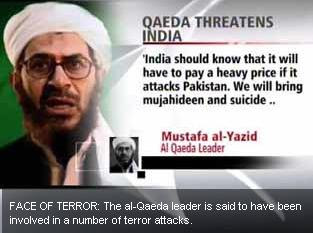
Ten weeks after the terror attacks in Mumbai that shook the world and sent India-Pakistan relations in deep freeze, Islamabad finally owned up that "a part of the conspiracy" was hatched in the country.
India welcomed as "positive" Pakistan's probe, but reminded Islamabad to take "credible action" and "dismantle the infrastructure of terrorism" in its territory.
Pakistan's Interior Minister Rehman Malik said at a crowded news conference in Islamabad that the terrorists, who slaughtered some 170 people in Mumbai in November and who India says were Pakistanis, were "non-state actors" - meaning, the Pakistani establishment had nothing to do with the massacre that has been roundly condemned around the world.
"This is an individual act, act of individuals or non-state actors. Their purpose is to create terror for their own motives. These motives need to be determined. Both India and Pakistan need to work it out," Rehman said. "A part of the conspiracy has been done in Pakistan," the minister admitted, "but a major part was shaped in India."
He said a first information report (FIR) was registered in Islamabad Thursday. The FIR has named nine people, including Zakiur Rahman Lakhvi, leader of the banned Lashkar-e-Taiba, Ajmal Amir Kasab, the lone surviving attacker captured during the Mumbai mayhem, as well as Javed Iqbal of Barcelona who had allegedly played a role in funding the attackers.
"The incident happened in India but part of the conspiracy has been done in Pakistan. Therefore, it is abetting conspiracy and facilitation. Anybody (Pakistani national) who directs or conspires to do an act of terrorism abroad is deemed to have done so in Pakistan," Malik maintained.
"The alleged mastermind has been located and is under investigation," he said, without giving out his name.
He added that a total of six men have been arrested in Pakistan for their links with the Mumbai massacre. These included Lakhvi of the LeT, which did the "planning" of the attacks.
All these "have given us a complete picture. Obviously these accounts lead to the (terrorist) leadership also", Malik said.
This is the first time Pakistan has admitted the involvement of its nationals in the terror attack on India, breaking the patterns of repeated denial and obfuscation in the past.
Welcoming the Pakistan probe, the Indian external affairs ministry said in a statement: "In their official response, the Pakistan authorities have admitted that elements in Pakistan were involved in the terrorist attacks on Mumbai."
"They are still in the process of investigating the attacks, and have taken certain actions including the arrest of some of those who were involved and filing a first information report," the ministry said. "This is a positive development," it added.
Responding to Pakistan's demand for more information and material relating to the Mumbai atrocity, India also agreed to examine the issues and will share whatever it can with Pakistan.
New Delhi, however, made it clear that it was determined to pursue the Mumbai attacks to its logical conclusion and asked Islamabad "to take credible steps to dismantle the infrastructure of terrorism in Pakistan."
"It remains India's goal to bring the perpetrators of the terrorist attacks on Mumbai to book, and to follow this process through to the end," the ministry said. "We would also expect that the Government of Pakistan take credible steps to dismantle the infrastructure of terrorism in Pakistan," it stated.
The Indian government's response came after Pakistan's Foreign Secretary Salman Bashir gave Islamabad's official response to India's dossier to New Delhi's High Commissioner Satyabrata Pal. India had given a dossier to Pakistan Jan 5 containing material that established connection between elements in Pakistan and the Nov 26 Mumbai attacks.
Pakistan, under increasing pressure to crack down on Islamists who have virtually taken over large areas bordering Afghanistan, had initially sought to deny any links with the 10 terrorists who sailed to Mumbai by sea from Pakistan Nov 26 and then went on a horrific killing spree that lasted three days and traumatised a nation.
Nine of the terrorists were killed and Kasab was captured. India said the terrorists were linked to LeT, which has reportedly had close links with the Pakistani intelligence.
"Our leadership is fully concerned and serious in bringing all the culprits to justice," Malik said. "I would like to assure the government of India, the people of India, we are with you."
The minister said Pakistan desired more information from India. He said a set of 30 questions has been sent to New Delhi through its envoy in Islamabad. These included fingerprints of all the dead terrorists and also better pictures of the men who were killed by Indian commandos.
"It's a positive step," commented Lalit Mansingh, a former foreign secretary. "The government should take it seriously and consider answers to some of their questions to bring the perpetrators to justice."
"At least they have admitted that part of the conspiracy was hatched in Pakistan," he said.
Analysts noted that the admissions come a day after the visit of Richard Holbrooke, US special envoy to Pakistan and Afghanistan, and in the wake of President Barack Obama's telephone call to President Asif Ali Zardari.
"International pressure seems to have worked on Pakistan," said K.Subrahmanyam, India's pre-eminent strategic analyst. "They have accepted handlers were in Pakistan."








